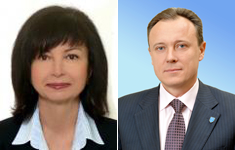Abstract
The paper analyses the formation of informational competence of translators in the Bachelor and Master degree programs. The structure and content of the informational competence of the translator are considered in the context of its coordination with the educational programs of translators and the standards of the translation services. There have been determined the stages of formation of the informational competence of the translators such as constructive, technological and integration, their correlation with the periods of study of the future translators, levels of their mastery of information technologies. The outcomes of each stage are specified and described in detail. It has been stated that one way to achieve high efficiency in the formation of information competence of translators may be the implementation of a comprehensive translation task individually for each student with the prospect of its realization throughout the training period in accordance with certain stages of the formation of information competence. The content and tasks of the stages of the formation of the informational competence of translators are determined. The goals of the stages of the information technologies study are detailed by a complex of information, qualification and scientific achievements: electronic terminology databases of a specialized field in several areas; translation memory bases for use in automated translation systems; the base of electronic links to terminological resources network; the base of electronic references to the corpus of parallel texts; certificates of traineeship in production structures for using automated translation systems or terminological management systems; certificates of knowledge of specialized software in translation from manufacturing companies, their dealers, certification centers.References
V. Yu. Bikov, "Problems and prospects of informatization of the educational system in Ukraine", Naukovy chasopys NPU after M.Dragomanov, Seria № 2, Komputerno-orientovani systemy navchannya: zb.nukovyh pr., Kyiv: NPU after M. Dragomanov, № 13 (20), р. 3-18, 2012. (in Ukrainian).
O. G. Glazunova, "Principles of modern university "academic cloud" formation based on open software platform", Information technologies and means of learning: zb. nauk. pr., Institute of the means of learning APN Ukraine, № 5 (43), р. 174-188, 2014. (in Ukrainian).
A. M. Gurzhij, O. V. Ovcharuk, "Discussion aspects of information and communication technologies competencies: international approaches and ukrainian prospеcts", Information Technologies in Education, № 15, р. 38-43, 2013. (in Ukrainian).
O. G. Kolgatin, Pedagogical diagnostics and information and communication technologies: monograph, Kharkiv, Ukraine: KhNPU, 2009. (in Ukrainian).
N. V. Morze, Information technologies in education, Kyiv, Vydavnycha grupa BHV, 2004. (in Ukrainian).
L. F. Panchenko, Information and educational environment of the modern university, Lugansk, Ukraine: LNU after T. Shevchenka, 2010. (in Ukrainian).
О. Bondarenko, "Computer-aided tools (CAT) literacy at Ukrainian universities: practices of implementation", Proceedings. Series: Philological Sciences, 146, p. 648-650, 2016. (in Ukrainian).
C. Nord, Loyalty and Fidelity in Specialized Translation". Confluências – Revista de Tradução Científica e Técnica, 4, p. 29-41, 2006. (in English).
A. Olkhovska, "Experimental testing of the effectiveness of the training of the future translators of translation with the use of information and communication technologies", Bulletin KNLU, Series: Pedagogy and Psychology 27, p. 98-107, 2017. (in Ukrainian).
D. Scheller-Boltz, "Competency requirements for translators and interpreters". In: Das Wort. Germanistisches Jahrbuch, р. 213-233, 2010. (in German).
R. O. Tarasenko, Formation of informational competence of future translators for the agrarian sector. Theory and practice: monograph, Kyiv, Ukraine: Comprint, 2017. (in Ukrainian).
European Master's in Translation. "Competence Framework 2017". Brussels, 2017. (in English).
Standard EN ISO 17100:2015. Translation Services. Requirements for translation services, London, British Standards Institution, 2015. (in English).
Standard F 2575 – 06. Guide for Quality Assurance in Translation, ASTM International, 2006. (in English).
Authors who publish in this journal agree to the following terms:
- Authors hold copyright immediately after publication of their works and retain publishing rights without any restrictions.
- The copyright commencement date complies the publication date of the issue, where the article is included in.
Content Licensing
- Authors grant the journal a right of the first publication of the work under a Creative Commons Attribution-NonCommercial-ShareAlike 4.0 International License (CC BY-NC-SA 4.0) that allows others freely to read, download, copy and print submissions, search content and link to published articles, disseminate their full text and use them for any legitimate non-commercial purposes (i.e. educational or scientific) with the mandatory reference to the article’s authors and initial publication in this journal.
- Original published articles cannot be used by users (exept authors) for commercial purposes or distributed by third-party intermediary organizations for a fee.
Deposit Policy
- Authors are permitted and encouraged to post their work online (e.g., in institutional repositories or on their website) during the editorial process, as it can lead to productive exchanges, as well as earlier and greater citation of published work (see this journal’s registered deposit policy at Sherpa/Romeo directory).
- Authors are able to enter into separate, additional contractual arrangements for the non-exclusive distribution of the journal's published version of the work (e.g., post it to an institutional repository or publish it in a book), with an acknowledgement of its initial publication in this journal.
- Post-print (post-refereeing manuscript version) and publisher's PDF-version self-archiving is allowed.
- Archiving the pre-print (pre-refereeing manuscript version) not allowed.


